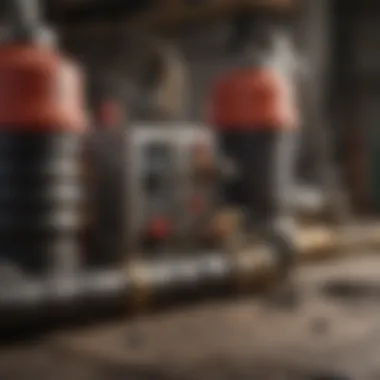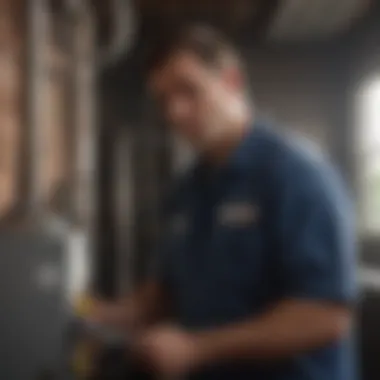Understanding HVAC Lead Installer Jobs: A Comprehensive Guide


Intro
The role of an HVAC lead installer is crucial in the heating, ventilation, and air conditioning industry. Understanding this position helps in grasping the technical requirements and the landscape of job opportunities. This guide aims to provide comprehensive insights into various aspects of HVAC lead installer jobs, including necessary skills, potential career paths, and factors affecting job availability across different regions.
As the demand for skilled HVAC professionals continues to rise, it is important to consider what makes a lead installer stand out. This role often requires not only technical knowledge but also leadership abilities. A well-rounded understanding of the work environment and expectations can significantly enhance one's job prospects and career trajectory in this field.
Foreword to HVAC Lead Installer Roles
In the HVAC (heating, ventilation, and air conditioning) industry, the role of a lead installer holds significant weight. This position acts as a cornerstone for successful project execution, ensuring that systems are installed in compliance with safety regulations and operational specifications. Understanding this role is crucial not only for those pursuing a career in HVAC but also for employers aiming to hire skilled professionals.
Definition and Responsibilities
A lead installer is responsible for overseeing installations of HVAC systems in residential, commercial, and industrial settings. Their duties include ensuring that the installation process runs smoothly, from planning to completion. Key responsibilities often include:
- Supervising Installation Teams: They guide and manage a team of installers, ensuring that everyone adheres to project timelines and standards.
- Technical Evaluation: Assessing the specifications of HVAC systems and equipment to ensure suitability for the intended environment.
- Quality Control: Verifying that installations meet design requirements and operate efficiently.
- Compliance with Regulations: They ensure all work complies with local building codes and safety standards, which is crucial to prevent legal issues and ensure safety.
By clearly defining these responsibilities, aspiring HVAC lead installers can identify skills they must develop.
Importance in the HVAC Industry
The HVAC industry relies heavily on lead installers for various reasons. First, they are responsible for ensuring high-quality installations, which directly impact system performance and customer satisfaction. Good installations can lead to energy efficiency, decreased operational costs, and may enhance the lifespan of HVAC systems.
Moreover, lead installers serve as a bridge between project management and installation teams. They communicate project requirements and deadlines effectively, which is essential for smooth workflow and timely project delivery. This role is indispensable to uphold the industry's reputation for providing reliable and efficient heating and cooling solutions.
The quality and reliability of HVAC systems lie substantially within the hands of lead installers, making their role critical in the industry's ecosystem.
Key Skills Required for HVAC Lead Installers
The role of an HVAC lead installer is multifaceted and requires a range of skills. Mastery of these skills is vital for ensuring successful installations and operations. Understanding these key skills can help aspiring professionals align their training and experience accordingly.
Technical Proficiencies
Technical skills are at the core of HVAC lead installer jobs. Candidates must possess a solid understanding of heating, ventilation, and air conditioning systems. This includes knowledge of electrical components, refrigeration cycles, and ductwork fabrication. Only with this technical foundation can they troubleshoot issues effectively and maintain systems.
Furthermore, proficiency in using specialized tools like manifold gauges, pipe benders, and thermal imaging cameras is necessary. Knowledge about energy efficiency regulations and standards is also important. As energy-efficient systems become the norm, installers must adapt to new technologies. They should stay informed about advancements like variable refrigerant flow systems and smart HVAC systems. This not only enhances effectiveness but also positions them as valuable contributors to their teams.
Soft Skills and Team Collaboration
Beyond technical abilities, soft skills play a significant role in HVAC installation. Strong communication skills are essential. Lead installers must interact with clients, contractors, and team members seamlessly. Clear communication reduces misunderstandings and ensures projects run smoothly. They should also be able to train and guide less experienced staff, fostering a collaborative environment.
Moreover, problem-solving skills are crucial in this field. They will encounter unexpected challenges during installations. The ability to think critically and devise solutions quickly can prevent project delays. Flexibility and adaptability are also required traits. The job can bring varied challenges at different sites, so being open to change makes a significant difference.
Safety and Compliance Knowledge
Safety is paramount in HVAC installation. Installers must be aware of safety protocols to protect themselves and others. This includes understanding the hazards associated with refrigerants and electrical systems. They should always follow Occupational Safety and Health Administration (OSHA) guidelines and other relevant regulations.


Compliance knowledge extends to local, state, and federal building codes as well. Adhering to these codes ensures the safety and legality of installations. Familiarity with these regulations can prevent costly fines and ensure work quality.
An effective HVAC lead installer balances technical knowledge, interpersonal skills, and safety awareness, creating a skilled workforce equipped for industry challenges.
"Technical know-how combined with strong interpersonal skills leads to successful HVAC installations."
Educational Pathways and Certifications
Understanding the educational pathways and certifications relevant to HVAC lead installers is crucial for anyone considering this career. The right educational background provides foundational knowledge and skills, while certifications demonstrate competence and commitment to the profession. Investing in education and acquiring certifications can significantly enhance employability in this competitive field.
Relevant Educational Backgrounds
Typically, a high school diploma or GED is the minimum educational requirement for HVAC lead installers. However, pursuing further education can offer a substantial advantage. Many community colleges and technical schools provide programs specifically tailored for HVAC training. These programs often include both classroom instruction and hands-on experience. Topics covered usually involve basic electrical concepts, heating and cooling principles, and installation techniques.
In addition to general education, aspiring lead installers should consider obtaining an associate degree in heating, ventilation, and air conditioning technology. This advanced coursework can cover program-specific skills essential for the job. Moreover, apprenticeships offer practical field experience, which is invaluable. Completing an apprenticeship often leads to a robust understanding of the HVAC systems in a real-world setting.
Certifications Enhancing Employability
Certifications play a pivotal role in an HVAC lead installer's career. They not only signify a level of expertise but also enhance job prospects and salary potential. Highly regarded certifications include the EPA 608 Universal Certification, which is necessary for handling refrigerants. This certification is mandated by federal law and is critical for those working with HVAC systems.
Another important certification is the North American Technician Excellence (NATE) certification. This is widely recognized in the industry and demonstrates advanced knowledge and abilities in HVAC technology. Achieving NATE certification can elevate employability significantly.
"Certifications in the HVAC field not only enhance knowledge but also improve reputation in the market."
Additional certifications may include those offered by manufacturers, such as Trane or Carrier, which focus on specific equipment and installation processes. Candidates may also explore green technology certifications, as energy efficiency is increasingly important in the HVAC industry.
Overall, pursuing relevant educational backgrounds and acquiring the right certifications can considerably bolster an HVAC lead installer’s career trajectory and open doors to a variety of job opportunities.
Job Searching Strategies for HVAC Lead Installer Positions
Finding a suitable job as an HVAC lead installer can be a complex and competitive process. It requires a strategic approach to stand out among other candidates. Effective job searching strategies can significantly influence your opportunities in this field. By understanding the right methods, candidates can enhance their chances of securing a valuable position in the HVAC industry. These strategies provide insights on the best practices to follow while navigating the job market, highlighting how efforts can lead to fruitful employment.
Utilizing Online Job Platforms
The digital age has revolutionized how job seekers find potential employment. Online job platforms play a crucial role in the job search process for HVAC lead installers. Websites such as Indeed, LinkedIn, and Glassdoor are excellent starting points. These platforms allow users to filter job listings based on location, experience, and specific skills, making it easier to find relevant opportunities.
When utilizing these platforms, it's essential to have a complete and updated profile. This ensures that your skills and qualifications are visible to potential employers. Regularly updating your resume and including relevant keywords is equally important. Often, companies use specific terms to screen candidates, so being aware of industry vocabulary can be beneficial.
Furthermore, consider setting job alerts to receive notifications about new openings. This proactive approach saves time and allows you to apply as soon as a position becomes available.
Networking Within the Industry
Networking is another key component in the job search strategy for HVAC lead installers. Building a strong professional network can open many doors. Attend industry-related events, trade shows, or workshops. These gatherings provide opportunities to meet potential employers and other professionals in the field.
Additionally, do not underestimate the power of online networking. Platforms like LinkedIn enable you to connect with industry leaders and former colleagues. Engaging with relevant content and participating in discussions can expand your visibility in the field.


Participating in forums and groups, such as HVAC-specific subreddits or Facebook groups, can also facilitate connections. Through these groups, you can share experiences, seek advice, or even learn about job openings that are not widely advertised.
"The road to success is paved with hard work and strong connections."
Whether through online platforms or personal networks, being proactive will greatly enhance your job search endeavors.
Understanding Salaries and Benefits
Understanding the salaries and benefits associated with HVAC lead installer jobs provides crucial insights for anyone considering this career path. With diverse regions and varying demand for skilled labor, knowing what to expect in terms of compensation can greatly influence career decisions. This section aims to offer a comprehensive overview of average salary ranges and typical benefits, empowering potential installers to make informed choices about their futures in the HVAC industry.
Average Salary Range by Region
The average salary for HVAC lead installers can fluctuate significantly based on geographic location. Various factors such as cost of living, regional demand for HVAC services, and local industry standards all play a role in determining salary ranges. Typically, in urban areas with higher living costs, salaries tend to be greater than in rural settings.
In regions like California or New York, HVAC lead installers might earn between $70,000 and $90,000 annually. In contrast, states with a lower cost of living, like Arkansas or West Virginia, may see salaries ranging from $45,000 to $60,000. A detailed understanding of these disparities is essential for those considering relocation or just starting their careers.
Important Note: Always consider not just the salary, but also factors like housing costs and local economic conditions when evaluating job offers.
Typical Benefits Offered
In addition to salary, benefits form a significant part of the overall compensation package. Many employers in the HVAC sector provide essential benefits that contribute to job satisfaction and financial security. Common benefits that HVAC lead installers might receive include:
- Health Insurance: Coverage is often provided for medical, dental, and vision expenses.
- Retirement Plans: Employers may offer 401(k) plans with or without matching contributions, helping installers save for the future.
- Paid Time Off: Vacation days, sick leave, and paid holidays are generally included, allowing for better work-life balance.
- Training and Development: Opportunities for continuing education and certifications help workers stay competitive.
- Tools and Equipment: Some employers cover the costs of necessary tools or provide them directly, reducing the financial burden on employees.
Understanding salaries and benefits is vital for anyone looking to enter the HVAC field. Knowledge of these aspects helps future installers negotiate better offers and ensures they can maximize their potential earnings.
Career Advancement Opportunities
Understanding the career advancement opportunities within HVAC lead installer jobs is crucial for anyone looking to succeed in this field. Progressing in this profession can lead to a variety of benefits, including increased salary, greater job stability, and the potential for leadership roles. As HVAC technology evolves, installers must adapt and seek paths that align with their career aspirations. Engaging in these opportunities allows professionals to not only enhance their skills but also ensure they remain competitive in a dynamic job market.
Potential Career Paths
In the field of HVAC installation, there are several potential career paths that professionals can pursue. These paths depend on individual goals and the willingness to pursue further education or training. Some common trajectories include:
- Supervisory Roles: Experienced lead installers often transition into supervisory positions that involve overseeing installation teams. This role can include more responsibilities and higher compensation.
- Project Management: For those looking to expand their role, project management offers a chance to coordinate and manage HVAC projects from conception to completion.
- Sales and Consulting: Installers with strong communication skills may find opportunities in sales, promoting HVAC systems or offering consulting services to clients.
- Specialization Areas: Some professionals may choose to specialize in certain areas, such as geothermal systems or energy-efficient installations, which can lead to niche job markets with potentially higher pay.
"Career advancement is not just a possibility; it is a necessity in today's competitive environment."
Advancing along these pathways often requires a mix of experience, continuous education, and networking within the industry.
Continuing Education and Training
Continuing education is pivotal for HVAC lead installers aiming to advance their careers. Participating in ongoing training can utilize new technologies, improve installation techniques, and keep professionals informed about the latest industry standards. Some key avenues for this include:
- Certifications: Obtaining additional certifications from recognized organizations such as the North American Technician Excellence increases credibility and can lead to more job opportunities.
- Workshops and Seminars: Attending industry workshops or seminars provides insight into current trends and best practices when it comes to installation techniques.
- Online Courses: Many educational institutions and online platforms offer courses specifically tailored to HVAC professionals, allowing them to learn at their own pace and integrate new skills into their work.


In the HVAC industry, a commitment to education and training not only enhances a professional's skill set but also demonstrates to employers a dedication to their craft. This can ultimately result in better job security and higher earning potential.
Geographic Landscape of HVAC Lead Installer Jobs
Understanding the geographic landscape of HVAC lead installer jobs is crucial for anyone considering a career in this field. The distribution of these jobs varies significantly across different regions, influenced by factors such as climate, industry demand, and local economic conditions. Consequently, knowing where the opportunities lie can enhance job prospects for aspiring HVAC professionals.
Regions with High Demand
Certain regions show a marked increase in demand for HVAC lead installers. Areas experiencing extreme temperatures either in summer or winter drive the necessity for heating, ventilation, and air conditioning systems. Cities like Phoenix, Arizona, and Minneapolis, Minnesota, present contrasting climates. These areas constantly require skilled HVAC technicians to manage installation, repair, and maintenance tasks. In warmer regions, such as Florida, the need for cooling systems grows, impacting the demand for skilled installers. Urban centers also generally have a higher concentration of HVAC jobs due to the increasing number of residential and commercial properties. According to various sources, regions such as California and Texas consistently report elevated requirements for HVAC professionals.
"The job market for HVAC lead installers is shaped significantly by the local climate and economic activity in different regions."
Considerations for Relocation
Relocating for an HVAC lead installer job requires careful consideration. One must weigh factors such as cost of living, job market saturation, and potential career advancements in the new area. Some states might offer competitive salaries, but the higher cost of living could offset financial benefits. Additionally, understanding the stability of the job market in the region is essential. Data on local companies, housing developments, and upcoming projects can provide insight into future job opportunities. Researching community resources can also help ease the transition, as establishing local connections can be pivotal in finding job opportunities and gaining insights into the work environment. Being adaptable and well-informed improves overall job satisfaction and career growth in a new geographic location.
Challenges and Considerations in HVAC Installation
Understanding the challenges that come with HVAC installation is essential for aspiring lead installers. These challenges not only affect installation processes but also impact job satisfaction, safety, and career longevity. By recognizing these elements, professionals can better prepare for the demands of the job.
Physical Demands of the Role
The role of an HVAC lead installer is physically demanding. Installers often lift heavy equipment, climb ladders, and work in cramped spaces. Physical endurance is crucial. Installers spend many hours on their feet and may need to work in extreme temperatures, both hot and cold. This can take a toll on the body over time. Proper training in lifting techniques and body mechanics is vital to prevent injuries. Additionally, using tools and machinery safely should be a core part of the installer’s daily routine.
It is important to pay attention to physical health. Regular exercise can help maintain endurance. Stretching before and after shifts can prevent muscle strains. Also, understanding the limitations of one’s body is crucial. Knowing when to ask for assistance with heavy tasks can reduce the risk of injury.
Job Market Trends and Fluctuations
The HVAC job market is influenced by various factors, including seasonality and technological advancements. For instance, demand typically increases during extreme weather conditions, as people seek to install or repair HVAC systems. However, during milder periods, the need may decrease. This fluctuation can lead to uncertainties in job stability.
Moreover, evolving technologies in heating and cooling systems impact job availability. As energy-efficient systems gain popularity, there will be a need for skilled installers who understand these new technologies. Staying updated with industry trends and emerging systems can help installers remain competitive in the job market.
Culmination: Strategic Insights for Aspiring HVAC Lead Installers
Understanding the role of an HVAC lead installer is crucial for those looking to enter or advance in this field. This section synthesizes the essential points discussed in the article, providing a strategic overview. The HVAC industry is not static; it adapts with technological advances, customer preferences, and regulatory changes. Consequently, aspiring installers should continuously hone their skills and stay updated with industry trends.
The importance of this conclusion lies in summarizing key takeaways and emphasizing the future outlook of the HVAC profession. It is vital to recognize that success in this role is not solely defined by technical skills. Soft skills, like communication and teamwork, remain equally important. Aspiring professionals should also prioritize safety and compliance knowledge. This focus not only fulfills job requirements but also enhances job security and professional reputation.
Summary of Key Takeaways
- Technical Proficiency: Mastery of HVAC systems is a necessity.
- Soft Skills: Communication and collaboration are crucial for team success.
- Safety Knowledge: Familiarity with safety regulations protects both workers and clients.
- Certifications and Education: Relevant education and certifications improve employability.
- Career Advancement: Pursue ongoing education and training for upward mobility in your career.
These points summarize what to focus on while preparing for a career as a lead installer. They emphasize a balanced approach to knowledge and skill development.
Future Outlook for the HVAC Industry
The HVAC industry is projected to grow, driven by increasing demands for energy efficiency and sustainable practices. With climate change concerns, there is a trend towards eco-friendly technologies such as geothermal systems and smart thermostats.
Homeowners are increasingly interested in reducing their carbon footprints, leading to a rise in energy-efficient installations. This demand suggests that HVAC lead installers will be essential in implementing these systems.
Moreover, technological advancements will continue to influence the industry. Installers will require training on new systems, and perhaps more importantly, on smart technologies. This evolution presents both challenges and opportunities. The skilled installer must be adaptable and ready to embrace changes.
In summary, the future is promising for those willing to invest in their knowledge and skills. Keep an eye on emerging trends and adapt strategies accordingly. Understanding these dynamics will provide a significant advantage for aspiring HVAC lead installers.















